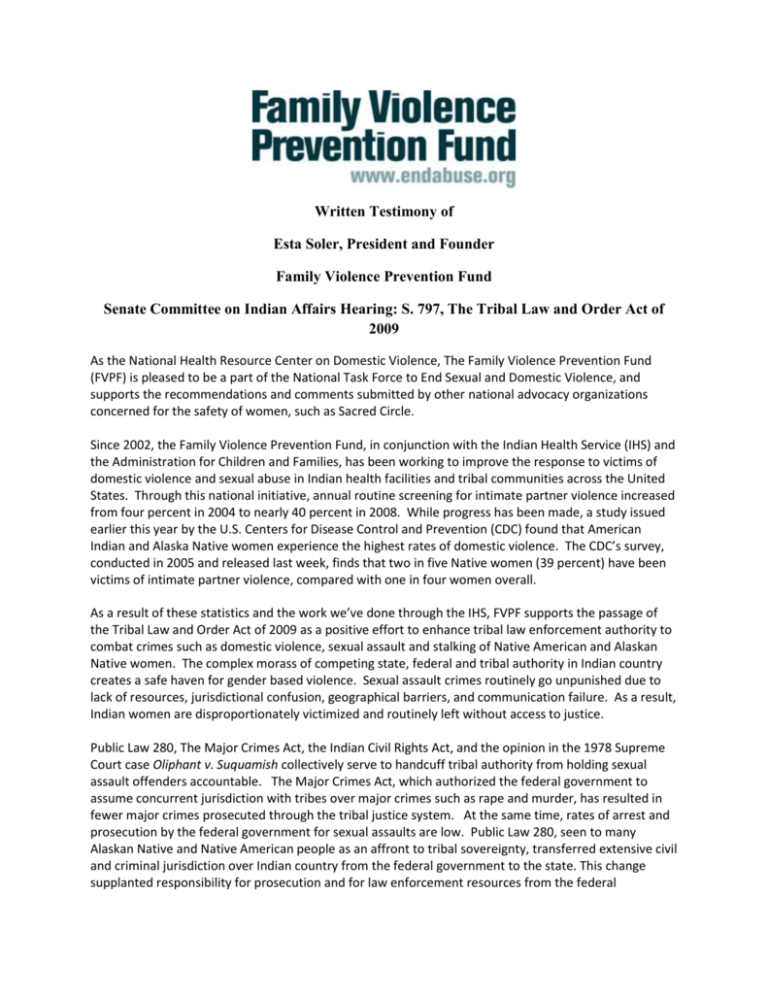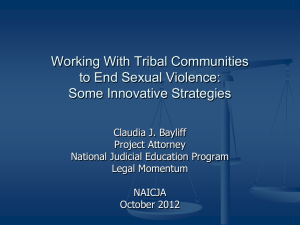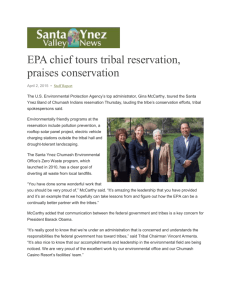
Written Testimony of
Esta Soler, President and Founder
Family Violence Prevention Fund
Senate Committee on Indian Affairs Hearing: S. 797, The Tribal Law and Order Act of
2009
As the National Health Resource Center on Domestic Violence, The Family Violence Prevention Fund
(FVPF) is pleased to be a part of the National Task Force to End Sexual and Domestic Violence, and
supports the recommendations and comments submitted by other national advocacy organizations
concerned for the safety of women, such as Sacred Circle.
Since 2002, the Family Violence Prevention Fund, in conjunction with the Indian Health Service (IHS) and
the Administration for Children and Families, has been working to improve the response to victims of
domestic violence and sexual abuse in Indian health facilities and tribal communities across the United
States. Through this national initiative, annual routine screening for intimate partner violence increased
from four percent in 2004 to nearly 40 percent in 2008. While progress has been made, a study issued
earlier this year by the U.S. Centers for Disease Control and Prevention (CDC) found that American
Indian and Alaska Native women experience the highest rates of domestic violence. The CDC’s survey,
conducted in 2005 and released last week, finds that two in five Native women (39 percent) have been
victims of intimate partner violence, compared with one in four women overall.
As a result of these statistics and the work we’ve done through the IHS, FVPF supports the passage of
the Tribal Law and Order Act of 2009 as a positive effort to enhance tribal law enforcement authority to
combat crimes such as domestic violence, sexual assault and stalking of Native American and Alaskan
Native women. The complex morass of competing state, federal and tribal authority in Indian country
creates a safe haven for gender based violence. Sexual assault crimes routinely go unpunished due to
lack of resources, jurisdictional confusion, geographical barriers, and communication failure. As a result,
Indian women are disproportionately victimized and routinely left without access to justice.
Public Law 280, The Major Crimes Act, the Indian Civil Rights Act, and the opinion in the 1978 Supreme
Court case Oliphant v. Suquamish collectively serve to handcuff tribal authority from holding sexual
assault offenders accountable. The Major Crimes Act, which authorized the federal government to
assume concurrent jurisdiction with tribes over major crimes such as rape and murder, has resulted in
fewer major crimes prosecuted through the tribal justice system. At the same time, rates of arrest and
prosecution by the federal government for sexual assaults are low. Public Law 280, seen to many
Alaskan Native and Native American people as an affront to tribal sovereignty, transferred extensive civil
and criminal jurisdiction over Indian country from the federal government to the state. This change
supplanted responsibility for prosecution and for law enforcement resources from the federal
government to the states and rendered many tribes in PL-280 states severely under-resourced. In
addition, many state law enforcement agencies and courts are reluctant to become involved in Indian
country crimes.
The Indian Civil Rights Act provided that tribes can only sentence for up to one year in jail and a $5000
fine. This severely restricted tribal ability to hold offenders accountable for serious crimes and creates a
windfall for sexual predators and domestic abusers. As a result, perpetrators of crime against Indian
women face less penalties than for the same crime against non-Indian women.
Oliphant v. Suquamish eliminated tribal authority over non-Indian perpetrators on tribal land. As studies
show that majority of sexual assault against Indian women is committed by non-Indian men, this
decision further restricts tribes from protecting victims of crime.
The Tribal Law and Order Act of 2009 takes substantial steps towards rectifying some of the legal
obstacles that prevent tribal law enforcement from creating safe and violence- free communities in
Indian country . We strongly support the following provisions:
Section 102 of the bill would require federal prosecutors to notify tribal law enforcement when they
decline to prosecute a case that impacts Native American and Alaskan Native people. This provision will
provide tribal law enforcement the opportunity to hold offenders accountable where the federal
government cannot or will not prosecute. Historically, federal prosecution rates of sexual assaults and
other gender based violence has been low. Geography, lack of coordination, heavy U.S. attorney
caseloads, low budgets and federal law enforcement priorities have contributed to the low prosecution
rate. In addition, some Native American and Alaskan Native women do not see extra-tribal enforcement
as an option, particularly in sexual assault cases. These declination reports will provide victims an
alternative to federal prosecution.
While the tribes’ sentencing authority is still extremely constrained, this bill takes positive steps to
increase tribal authority to sentence from 1 to 3 years. Under this bill, sexual assault victims would
have an increased opportunity for justice in the tribal courts.
Title II of the bill will provide PL 280 tribes with recourse from the federal government to ask for
assistance with the prosecution of major crimes where the states have the authority, but lack the
resources, to prosecute. This provision will further close the loophole in PL 280 states where crime
victims routinely experience complete failure of justice due to jurisdictional confusion, geographical
boundaries, and lack of resources.
Due to the limitations on tribal law enforcement authority, many tribes utilize civil protection orders to
protect victims of domestic and sexual violence. In addition to state reticence to enforce tribal court
issued orders, most tribes do not have the infrastructure to enter their orders in the NCIC Protection
Order File. This results in a lack or delay in enforcement, jeopardizes the safety of Native women and
effectuates yet another loophole for violent offenders in Indian country. Title III of the Tribal Law and
Order Acts would increase tribal access to NCIC and improve law enforcement’s ability to track and
arrest violent offenders.
Cross-deputization of state and tribal law enforcement officers is essential where tribal lands are
adjacent to non-tribal territories and gender based violent offenders can easily flee from Indian country
to state land. Title II of the bill would encourage and provide financial support to states and tribes to
engage in cooperative law enforcement agreements that would permit greater collaboration between
state and tribal law enforcement and facilitate the apprehension of sexual offenders that cross
jurisdictions.
The Tribal Advisory Committee to the DOJ’s Indian Law and Order Commission as proposed in this bill
would enhance the federal government’s ability to improve law enforcement in Indian country with the
voice of the community it hopes to serve. The presence of tribal representatives is essential to ensure
culturally appropriate practices and to begin to unravel the decades of legal disenfranchisement of tribal
communities.
Title VI of the Tribal Law and Order Act of 2009 would require education programs for law enforcement
and Indian Health Services personnel to improve the collection of forensic evidence in sexual assault
cases and thereby improve the ability to prosecute sexual assaults in Indian country. FVPF supports this
portion of the bill that would also implement standardized protocols for IHS personnel to respond to
sexual assault victims.
We appreciate and thank Chairman Dorgan and the Senate Committee on Indian Affairs for the
opportunity to submit this testimony and express our support for those sections of S. 797. We look
forward to working with you to prevent intimate partner violence and improve the health and safety of
Native American and Alaskan Native women victims.








